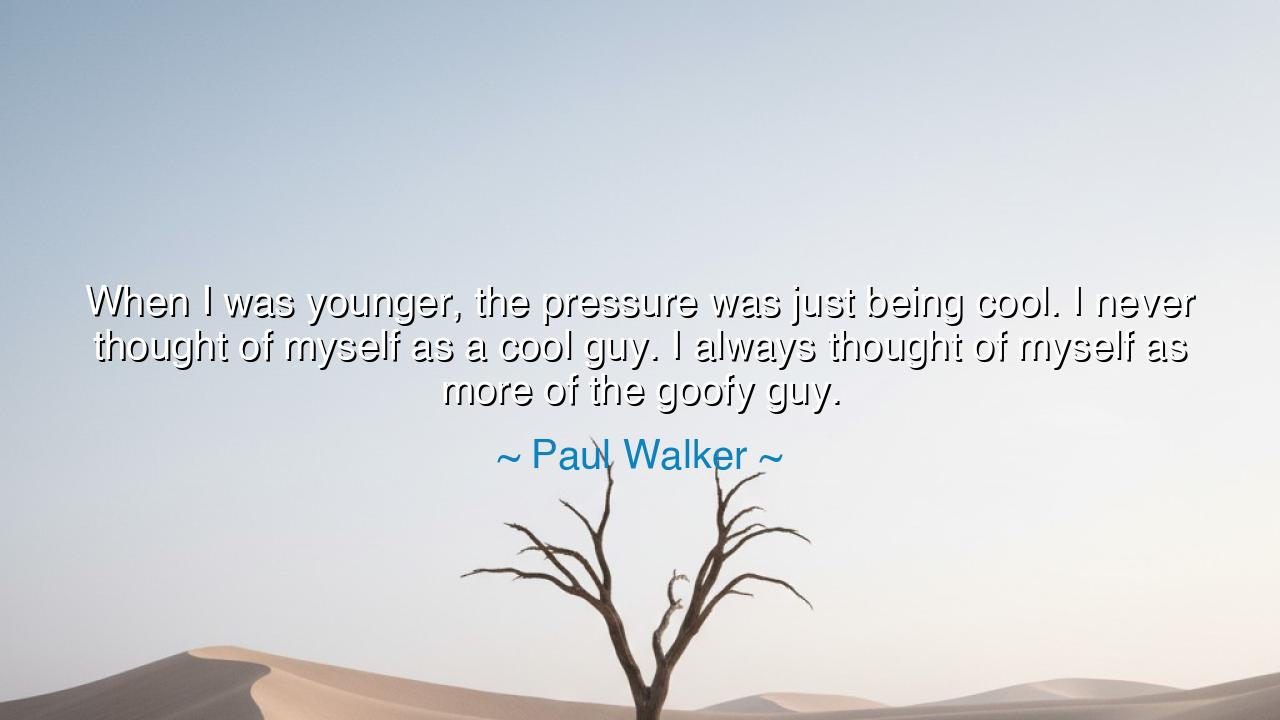
When I was younger, the pressure was just being cool. I never
When I was younger, the pressure was just being cool. I never thought of myself as a cool guy. I always thought of myself as more of the goofy guy.






Paul Walker’s words, "When I was younger, the pressure was just being cool. I never thought of myself as a cool guy. I always thought of myself as more of the goofy guy," capture the universal struggle of youth—the desire to fit in, to be seen as worthy of admiration by others. Coolness, that elusive and often superficial trait, is one that many chase, yet few truly possess. Walker’s reflection reveals a deeper truth: coolness is often an external construct, defined by others, while true worth and identity lie in embracing one's authentic self, even if that means being perceived as "goofy" or unconventional.
The ancients understood this struggle well. Socrates, the philosopher who questioned the very nature of virtue and knowledge, was never concerned with coolness or outward appearances. In fact, many saw him as odd and eccentric. He didn’t concern himself with being admired or being part of the popular crowd. Rather, he sought to live a life of integrity and self-examination. His appearance and mannerisms might have seemed unremarkable or even goofy to some, but it was his wisdom and willingness to embrace his own truth that made him truly great. Socrates’ life teaches us that true greatness is not found in striving to be seen as cool, but in embracing authenticity and self-reflection.
Paul Walker’s admission about never seeing himself as cool speaks to the deep tension that exists between the outward pressures of society and the inner workings of the self. Throughout history, many figures who have been celebrated for their uniqueness have been ridiculed or rejected in their time. Consider Vincent van Gogh, who struggled with isolation and rejection during his life. The very qualities that set him apart—the oddness in his work and his eccentricity—made him an outsider. Yet, today, he is regarded as one of the most influential artists in history. In this way, Walker’s wisdom and van Gogh's legacy remind us that the road to true fulfillment lies not in trying to fit into society's narrow definition of coolness, but in being authentically ourselves, whatever that might look like.
Similarly, Leonardo da Vinci, often celebrated as one of the greatest minds to ever live, did not fit neatly into society's traditional mold of what it meant to be “cool.” His wide-ranging interests, from anatomy to art to engineering, made him seem, at times, like a visionary out of place. Yet, it was this very eccentricity, his refusal to be constrained by conventional norms, that allowed him to innovate and lead. Like Walker, Leonardo was more than just an individual striving for status; he was a person committed to his curiosity, his creativity, and his inner drive—not to the expectations of the outside world.
The lesson from Walker’s words is that true fulfillment comes not from conforming to the standards of coolness set by society, but from finding peace in who we truly are. Being goofy or quirky—being authentic—is far more valuable than seeking the approval of others. Our uniqueness is our strength, and when we embrace that uniqueness, we find the courage to step outside the shadow of superficial expectations and into the light of our own true selves. Like Socrates and da Vinci, we are called not to be defined by the world around us, but by our own passion, vision, and integrity.
The pressure to conform, to be something we are not in order to be accepted, is a burden that many carry throughout their lives. Yet, we must remember that authenticity is the key to real happiness and peace. The goofy guy—the one who embraces his own quirks, his own imperfections—is often the one who ultimately finds inner fulfillment, because he is no longer bound by the chains of societal expectation. He becomes free to create, to grow, and to thrive in a way that the “cool” cannot.
So, let us take Walker’s wisdom to heart. The pressure to be cool will always exist, but the true challenge is to release ourselves from that pressure and instead focus on what makes us unique. Let us find the strength to embrace our own authenticity, to live not for the approval of others, but for the joy of expressing who we truly are. In doing so, we not only free ourselves but also inspire others to do the same. Let us celebrate the quirks, the eccentricities, and the goofiness that make us who we are—because it is in these very qualities that we find our greatness.






AAdministratorAdministrator
Welcome, honored guests. Please leave a comment, we will respond soon